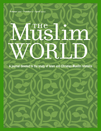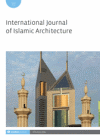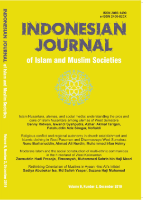
Al-Jamiah-Journal of Islamic Studies
Scope & Guideline
Cultivating Excellence in Islamic Academic Inquiry
Introduction
Aims and Scopes
- Interdisciplinary Islamic Studies:
The journal explores Islamic studies from various disciplinary perspectives, including history, sociology, anthropology, and law, facilitating a comprehensive understanding of Islam in contemporary contexts. - Cultural and Ethnographic Research:
A significant focus is on the cultural expressions and practices of Muslim communities, particularly in Southeast Asia, highlighting the diversity within Islamic practices and beliefs. - Historical Analysis:
The journal emphasizes historical research, particularly through archival studies, to shed light on the historical development of Islamic thought and practices, especially in the context of Indonesia and other regions. - Legal and Ethical Discussions:
There is a consistent focus on Islamic law (fiqh) and its applications, addressing contemporary legal challenges and ethical dilemmas faced by Muslim communities. - Interreligious Dialogue:
The journal encourages studies that promote interreligious understanding and cooperation, reflecting on the dynamics of religious tolerance and coexistence in multicultural societies.
Trending and Emerging
- Impact of Globalization on Islamic Identity:
There is a growing interest in how globalization affects Islamic identity and practices, particularly among Muslim minorities in non-Muslim majority countries, reflecting the challenges and adaptations of these communities. - Islam and Environmental Ethics:
Emerging themes around environmental issues and Islamic perspectives on ecology indicate a rising awareness of the intersection between Islam and ecological concerns, particularly in the context of climate change. - Digital Islam and Technology:
Studies focusing on the impact of digital technology on Islamic practices, including the role of social media in shaping modern Islamic discourse, are becoming increasingly prominent. - Political Islam and Governance:
Research on the dynamics of political Islam, including the role of Islamic movements in governance and their responses to contemporary political challenges, shows a significant upward trend. - Women's Agency in Islam:
An increasing number of studies are highlighting women's roles and agency within Islamic contexts, contributing to discussions on feminism, gender, and social justice in Muslim societies.
Declining or Waning
- Traditionalist Islamic Perspectives:
There has been a noticeable decline in papers focusing solely on traditionalist interpretations of Islamic texts, suggesting a shift towards more contemporary and contextualized approaches to Islamic thought. - Historical Narratives of Islamic Expansion:
Research centered around the historical narratives of Islamic expansion and conquests appears less frequently, indicating a potential waning interest in this area as scholars focus more on modern implications and experiences. - Islamic Mysticism (Sufism):
Although Sufism remains an important aspect of Islamic studies, specific studies on traditional Sufi practices seem to be declining, possibly due to an increased focus on political and social aspects of Islam.
Similar Journals

MUSLIM WORLD
Advancing Interdisciplinary Insights into the Muslim ExperienceThe Muslim World is a prestigious peer-reviewed journal published by Wiley, focusing on the intricate relationships and contributions of Islam within various domains of humanities and social sciences. With its roots tracing back to 1911 and converging until 2024, the journal encompasses an expansive historical perspective, enriching the understanding of Islamic culture, history, and its contemporary political significance. The journal holds a commendable impact in the field, as evidenced by its Q1 ranking in History and Religious Studies, and notable positions in Political Science and Sociology categories, signifying its substantial influence among researchers and academics. While operating under a subscription model, The Muslim World remains a crucial platform for fostering scholarly dialogue, promoting innovative research, and disseminating pivotal findings in its areas of study. With an ISSN of 0027-4909 and an E-ISSN of 1478-1913, it is committed to advancing knowledge within the framework of interdisciplinary studies, appealing to seasoned scholars and emerging researchers alike.

Journal of College of Sharia and Islamic Studies
Navigating the Complexities of Islamic DiscourseThe Journal of College of Sharia and Islamic Studies, published by Qatar University, College of Sharia & Islamic Studies, is a premier academic platform dedicated to advancing the understanding and scholarly discourse in the field of Islamic studies and Sharia law. With an ISSN of 2305-5545 and an E-ISSN of 2523-1715, this open-access journal has been freely available since 2005, promoting accessibility to high-quality research for a global audience. Situated in Doha, Qatar, the journal serves as a pivotal resource for researchers, professionals, and students who seek to explore the complexities of Islamic jurisprudence, ethics, and philosophy. The journal's commitment to promoting rigorous scholarship is evidenced through its diverse articles, which not only address classical and contemporary issues in Islamic studies but also engage with interdisciplinary perspectives. As an essential resource within the academic community, it aims to foster dialogue and collaboration among scholars worldwide.

Nazariyat-Journal for the History of Islamic Philosophy and Sciences
Advancing Knowledge in Islamic Philosophy and SciencesNazariyat-Journal for the History of Islamic Philosophy and Sciences, published by SCIENTIFIC STUDIES ASSOCIATION, is a leading academic journal dedicated to the exploration and dissemination of research in the history of Islamic philosophy and sciences. With an ISSN of 2528-8563 and E-ISSN 2547-9415, this journal has adopted an Open Access model since 2014, ensuring that valuable insights and scholarly work are readily available to a global audience. Situated in Istanbul, Turkiye, the journal serves as a vital platform for researchers, students, and professionals seeking to deepen their understanding of the rich intellectual traditions of Islamic thought. Although the HIndex is currently unavailable, the journal is committed to upholding rigorous academic standards while encouraging interdisciplinary dialogue. By bridging historical examination with contemporary relevance, Nazariyat plays an essential role in fostering a nuanced appreciation of Islamic intellectual heritage within the broader scientific community.

Global Journal Al-Thaqafah
Illuminating the intersections of culture and scholarship.Global Journal Al-Thaqafah is a distinguished open-access journal published by UNIV SULTAN AZLAN SHAH, dedicated to advancing knowledge and research in the fields of arts, humanities, and cultural studies. Since its inception in 2011, this journal has provided a valuable platform for scholars and practitioners to disseminate their findings, fostering dialogue and interdisciplinary collaboration. Based in Malaysia, it serves a global audience, bridging gaps in cultural discourse and contributing to the understanding of diverse cultural phenomena. With its current status in the Q3 quartile of the Arts and Humanities (Miscellaneous) and Cultural Studies categories, the journal is recognized for its impactful contributions to these fields. The open-access model allows for unrestricted access to research, encouraging wider engagement and dissemination of knowledge. Researchers, professionals, and students alike will find in the Global Journal Al-Thaqafah a vital resource for contemporary cultural studies and a beacon for future research directions.

Journal of Al-Tamaddun
Fostering Global Scholarship in Islamic StudiesWelcome to the Journal of Al-Tamaddun, an esteemed academic publication dedicated to the exploration of Islamic history, culture, and anthropology. Published by UNIV MALAYA, ACAD ISLAMIC STUDIES, this open-access journal has been contributing to scholarly discourse since 2008, allowing comprehensive and unrestricted access to its rich array of research articles. The journal proudly ranks in the upper quartiles of several categories for 2023, including Q1 in History and Religious Studies and Q2 in Anthropology and Cultural Studies, reflecting its significant impact and relevance in these fields. Hailing from Malaysia, the journal serves as a global platform for researchers and scholars, fostering interdisciplinary dialogue and enhancing our understanding of civilization through a critical Islamic perspective. With its Scopus rankings highlighting its standing within arts and humanities, the Journal of Al-Tamaddun aims to propel innovative research and contribute to the development of knowledge across diverse academic landscapes.

International Journal of Islamic Architecture
Cultivating Interdisciplinary Insights into Islamic DesignThe International Journal of Islamic Architecture, published by INTELLECT LTD in the United Kingdom, is a pivotal scholarly resource dedicated to the exploration of Islamic architecture, design, and cultural expressions within a contemporary framework. With ISSN 2045-5895 and E-ISSN 2045-5909, this journal targets an interdisciplinary audience by bridging the gap between architecture, geography, urban studies, and the arts. Established in 2012, it has swiftly garnered recognition, achieving notable rankings such as Q3 in Architecture and Q2 in Visual Arts and Performing Arts by 2023. Although it currently does not offer open access, its articles are meticulously peer-reviewed, ensuring high academic standards and relevance. Emphasizing the significance of Islamic architectural heritage in global contexts, the journal seeks to foster innovative perspectives and critical discourse, making it an essential platform for researchers, professionals, and students alike to engage with contemporary architectural practices and cultural dialogues.

Intellectual Discourse
Empowering Scholars with Cutting-Edge ResearchIntellectual Discourse is a distinguished academic journal published by the International Islamic University Malaysia's Press Research Management Center. This journal, with an ISSN of 0128-4878 and E-ISSN of 2289-5639, serves as a vital platform for scholarly work in the fields of Philosophy, Sociology, and Political Science. Since its inception in 2011, it has strived to foster a multidisciplinary dialogue, blending theoretical insights with empirical research. Ranked Q2 in Philosophy and Q3 in Sociology and Political Science as of 2023, Intellectual Discourse is committed to advancing knowledge and understanding through rigorous analysis and innovative perspectives. Researchers and scholars can access its insightful publications to stay abreast of current trends and discussions that shape their fields. With an ongoing commitment to intellectual rigor, the journal positions itself as an essential resource for academics and students aiming to explore complex social phenomena and philosophical inquiries.

Indonesian Journal of Islam and Muslim Societies
Advancing scholarly discourse on Islam and society.Indonesian Journal of Islam and Muslim Societies (IJIMS) is a leading platform for scholarly discourse in the fields of Islamic studies and social sciences, published by INST AGAMA ISLAM NEGERI-IAIN SALATIGA. Since its establishment in 2011, IJIMS has been dedicated to advancing the understanding of Islamic culture, society, and politics, with an impressive impact reflected in its Q1 ranking in Religious Studies and Q2 in Sociology and Political Science as of 2023. The journal not only ranks among the top in the Scopus database, occupying the 19th position in the Arts and Humanities—Religious Studies category, but it also offers open access to its content, making it readily available to a global audience. This commitment to accessibility ensures that researchers, students, and professionals can engage with high-quality research that informs and shapes contemporary dialogue on Islam and Muslim societies. With a convergence of rich academic contributions through to 2024, IJIMS stands as a vital resource for those looking to explore the complexities of Islam in a modern context.

Journal of Islamic Manuscripts
Enriching Cultural Insights Through Manuscript StudiesJournal of Islamic Manuscripts is a prestigious academic journal published by BRILL, dedicated to the study and preservation of Islamic manuscripts from their historical, cultural, and artistic perspectives. With an ISSN of 1878-4631 and an E-ISSN of 1878-464X, this journal serves as a vital platform for researchers, professionals, and students interested in Cultural Studies, Visual Arts, and Performing Arts. Housed in the Netherlands, the journal boasts a commendable rank within Scopus, showcasing its significant impact within its fields—ranking #229 in Visual Arts and Performing Arts and #690 in Cultural Studies for 2023. Operating under a traditional subscription model, the journal ensures its contributions are accessible to a global audience dedicated to furthering the understanding of Islamic art and heritage. Spanning from its inception in 2010 through 2024, the journal promises to continue enhancing knowledge and appreciation of the diverse narratives encapsulated in Islamic manuscripts.

Eskiyeni
Unleashing New Perspectives in Religious StudiesEskiyeni is a prominent open-access journal published by ANADOLU ILAHIYAT AKADEMISI, specializing in theological and religious studies. Since its inception, Eskiyeni has fostered scholarly dialogue and critical analysis within the fields of theology and philosophy, making significant contributions to contemporary discourses on spirituality, ethics, and cultural studies. With its commitment to open access since 2013, the journal facilitates unrestricted dissemination of research findings, empowering researchers, professionals, and students to engage with new insights and methodologies. Although specific metrics like HIndex and Scopus rankings have yet to be established, the journal continues to attract a diverse range of academic contributions, promoting a vibrant exchange of ideas that reflect the dynamism of its academic disciplines. Located in Ankara, Turkey, Eskiyeni is strategically positioned to highlight both regional and global perspectives in religious scholarship, making it an invaluable resource for anyone invested in the progression of theological research.